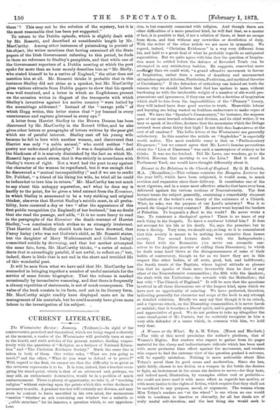CURRENT LITERATURE.
The Westminster Review: January. (Tiiftmer.)—In sight of the controversies, practical and theoretical, which are being waged so fiercely at the moment, a reader of the Westminster will probably tarn at once to the fourth and sixth articles of the present number, dealing respec- tively with the questions of "Religion as a Subject of National Educa- tion" and "The Christian Evidence Society." Much the same line is taken in both of them. One writer asks, What are you going to teach?" and the other, "What do you want to defend or to prove ?" With regard to the first, we cannot see that the difficulty is as great as the reviewer represents it to be. It is true, indeed, that aleacher occu- pying his stand-point, which is that of an advanced and, perhaps, we may add, an 1 enthusiastic destructive, would be in a position of much embarrassment. There is plenty of opportunity, we take it, of "teaching religion" without entering upon the points which this writer declares it necessary to settle. A prudent teacher will certainly not discuss, and may even be content to leave unsettled in his own mind, the momentous 'question "whether an ark containing one window was a suitable or -.ssible structure" for its inmates, a question which, to our apprehen- Lona sion, is but remotely connected with religion. And though there are other difficulties of a more practical kind, he will find that, as a matter of fact, it is possible to find, if not a solution of these, at least an escape from them, and that without any cowardice or dereliction of duty. With the writer of the other article we are more in sympathy. We regard, indeed, "Christian Evidences" in a way very different from his, and hold to a great deal of what he probably regards as antiquated superstition. But we quite agree with him that the question of Inspira- tion must be settled before the defence of Revealed Truth can be attempted in any satisfactory fashion. He suggests, somewhat more scoffingly than we could wish, "a grand offensive movement in favour of Inspiration, rather than a series of desultory and unconnected skirmishes against Atheism, Pantheism, Positivism, and mythical theories of Christianity." If the defenders of orthodoxy can indeed set forth the reasons why we should believe that God has spoken to man, without burdening us with the intolerable weight of a number of old-world pre- possessions and ignorances, if they can set forth a doctrine of inspiration which shall be free from the impossibilities of the "Plenary" theory, they will indeed have done good service to truth. Meanwhile labour and learning are being wasted on fruitless endeavours to make ropes of sand. We have the "Speaker's Commentary," for instance, the magnum opus of our most learned scholars and divines, and its chief writer, if we may so speak of its editor, declares that the mountains which the Deluge covered were about thirty feet high ! Is not this Aim Siecitax.krruy at the cost of all candour ? The belles lettres of the Westminster are generally satisfactory. In this number the article on " Sophoklee" is especially worth notice. The most readable essay is that on "Parliamentary Eloquence ; " but we cannot agree that Mr. Lowe's famdus perorations about the "Lion of Clueronea " was such a masterpiece of oratory as he thinks. It was too far-fetched. Did Mr. Lowe, one wonders, go to the British Museum that morning to see the Lion ? Had it stood in Parliament Yard, one would have thought differently about it.






































 Previous page
Previous page